Quiz: What kind of heat pump are YOU?
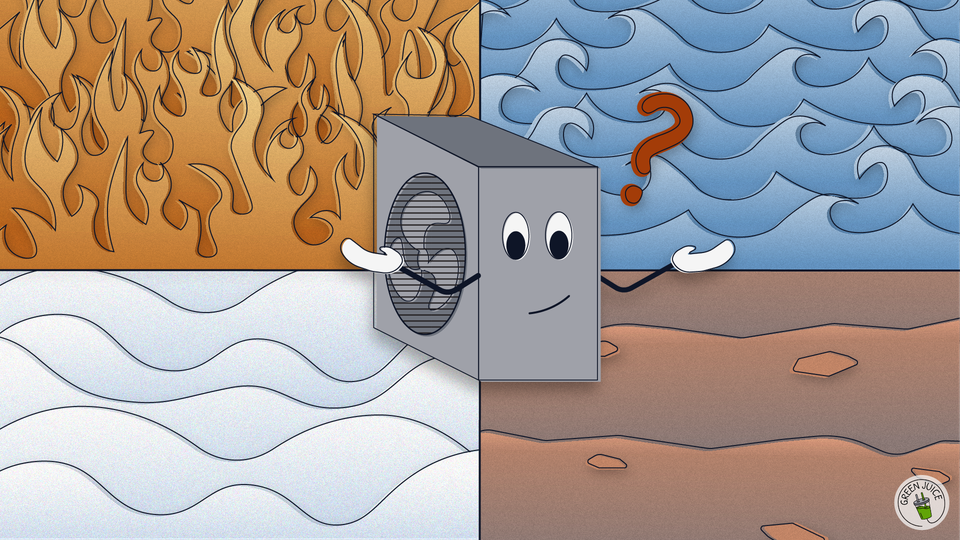
In case you missed it, read part 2 in our series on heat pumps here.
Today, we're throwing it back to 2000s-era internet with a highly scientific personality quiz—
What kind of heat pump are YOU?
There are many varieties of heat pump in the world, and knowing which one you are can be very tricky indeed. Thankfully, this foolproof quiz will help Green Juice readers answer that age-old question: what kind of heat pump am I?
Keep track of your answers, as Green Juice lacks the technical sophistication to embed an actual quiz here. Let's begin.
- How would you describe your personality?
A) Stable, grounded, routine-oriented
B) Seasonally depressive
C) Explosive... but I've learned to control it
D) I go with the flow, yo - Which element would you most like to Bend?
A) Earth
B) Air
C) Fire
D) Water - What's your star sign?
A) Taurus, Virgo, or Capricorn
B) Gemini, Libra, or Aquarius
C) Aries, Leo, or Sagittarius
D) Cancer, Scorpio, or Pisces - Do you live in an...
A) Apartment complex
B) Single-family home
C) Industrial warehouse
D) Van down by the river - Does your climate most resemble a...
A) Frigid tundra
B) Temperate grassland
C) The Permian Basin
D) Island paradise - How concerned are you about rising electricity prices?
A) Very concerned!!
B) Not concerned at all
C) Very concerned!!
D) Very concerned!!
Quiz results
If you answered mostly A...
Dig it! You're a Ground Source Heat Pump.
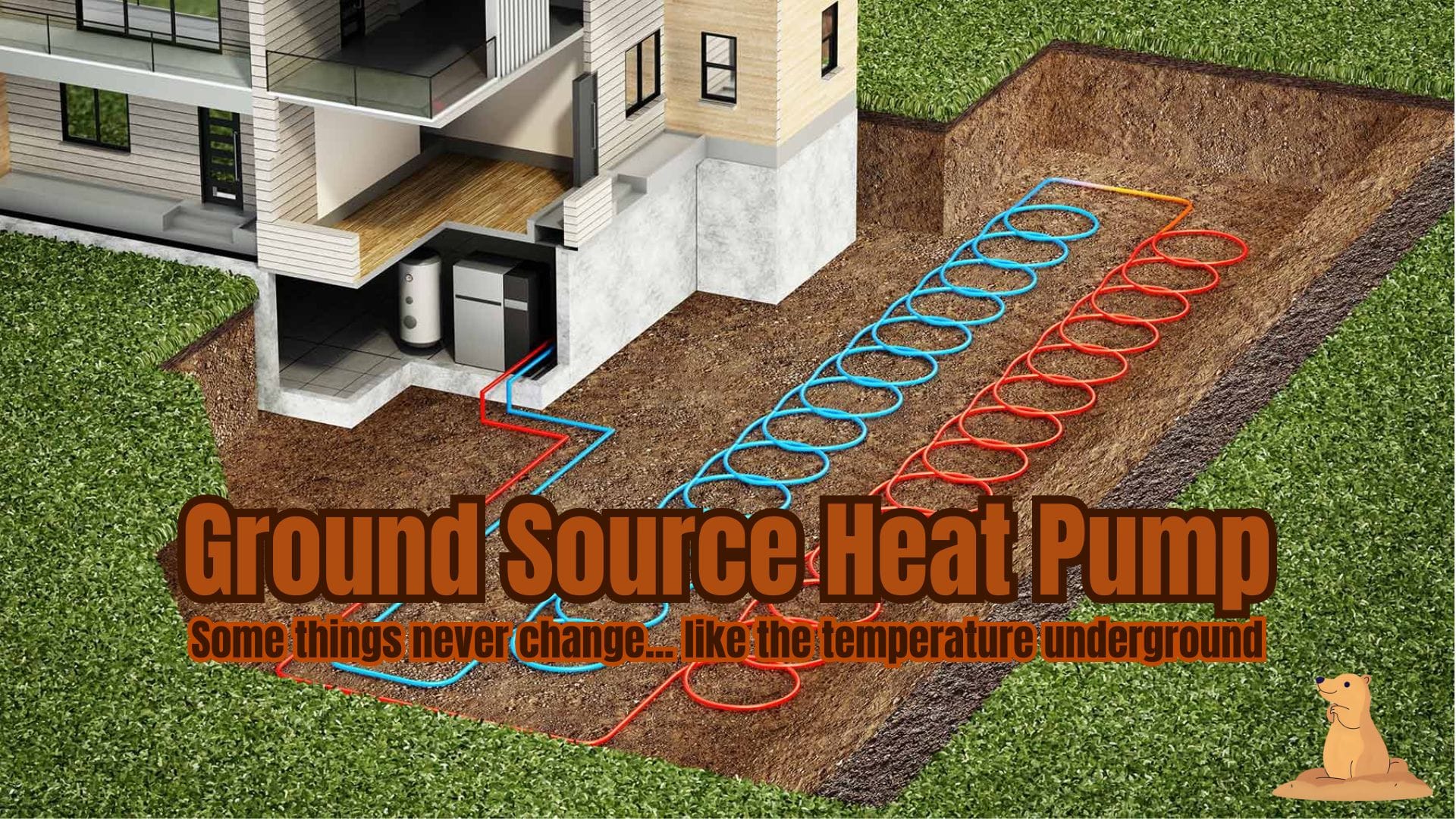
Ground Source Heat Pumps (GSHPs)
Also known as geothermal heat pumps, GSHPs are rock solid. They don't have to deal with fluctuating air temperatures affecting their efficiency, because the temp underground barely ever changes. Sure, it's on the cool side down there (that is, until you get way farther down), but there's more than enough heat energy in the dirt for GSHPs to achieve a Coefficient of Performance (COP) of 3–5×, which means for every 1 kW of electricity, you get 3–5 kW of heat.
Another perk: longevity. A properly installed GSHP system should last you 25–30 years, at a minimum.
How it works
First, you gotta dig a hole. You can either dig horizontally, as pictured above, which only requires going to a depth of a couple meters (but uses more surface area), or you can dig vertically, in which case you'll be borehole-ing down several hundred feet (or more!).
Next, install a looping network of underground pipes ('ground loops') and fill them with a heat-transfer fluid. The fluid brings heat energy to an aboveground heat pump, where the standard refrigerant compression cycle provides your home with comfy warmth via forced-air ductwork or a hydronic system that distributes heat to baseboards or radiators. (Some GSHP systems can be paired with ductless heads, but these are less common.)
GSHPs can also cool buildings by dissipating indoor heat into the ground.
Should you get one?
Are you a real estate developer? A city planner? Building a new home from the ground up?
If not, then a Ground Source Heat Pump probably isn't the right choice for you. Retrofits are understandably impractical. Digging is expensive, even when you're not trying to work around existing pipes and basements and buried time capsules—though startups like Bedrock Energy are using state-of-the-art sensing and drilling technologies to bring digging costs down.
The best use-case for GSHP is new construction, like this apartment building in Coney Island that features 153 geothermal wells, dug deeper than the Statue of Liberty is tall, which will warm and cool the new building’s 463 apartments.
More from the article:
Several projects that rely on geothermal heat are in the works or recently completed in all five boroughs of New York City, including at Brooklyn College, St. Patrick’s Cathedral in Manhattan and P.S. 62 in Staten Island. Efforts are ongoing to install geothermal systems at NYCHA’s Eastchester Gardens and Jackson Houses in The Bronx to provide hot water for over 1,700 apartments across 17 buildings.
Sick!
Brief tangent: Thermal Energy Networks and District Heating
What if your geothermal ground loops could connect to more than just one building? That's the premise of Thermal Energy Networks (TENs) and District Heating, both of which are ways to heat multiple buildings or even entire communities using various forms of sustainably sourced heat: geothermal, waste heat from power plants and sewers (!), biomass, and more. Both of these approaches are labor-, planning-, and capital-intensive... but the more folks who benefit from cheaply gotten heat, the faster the savings will accrue.
If you answered mostly B...
There's something in the air... You're an Air Source Heat Pump.
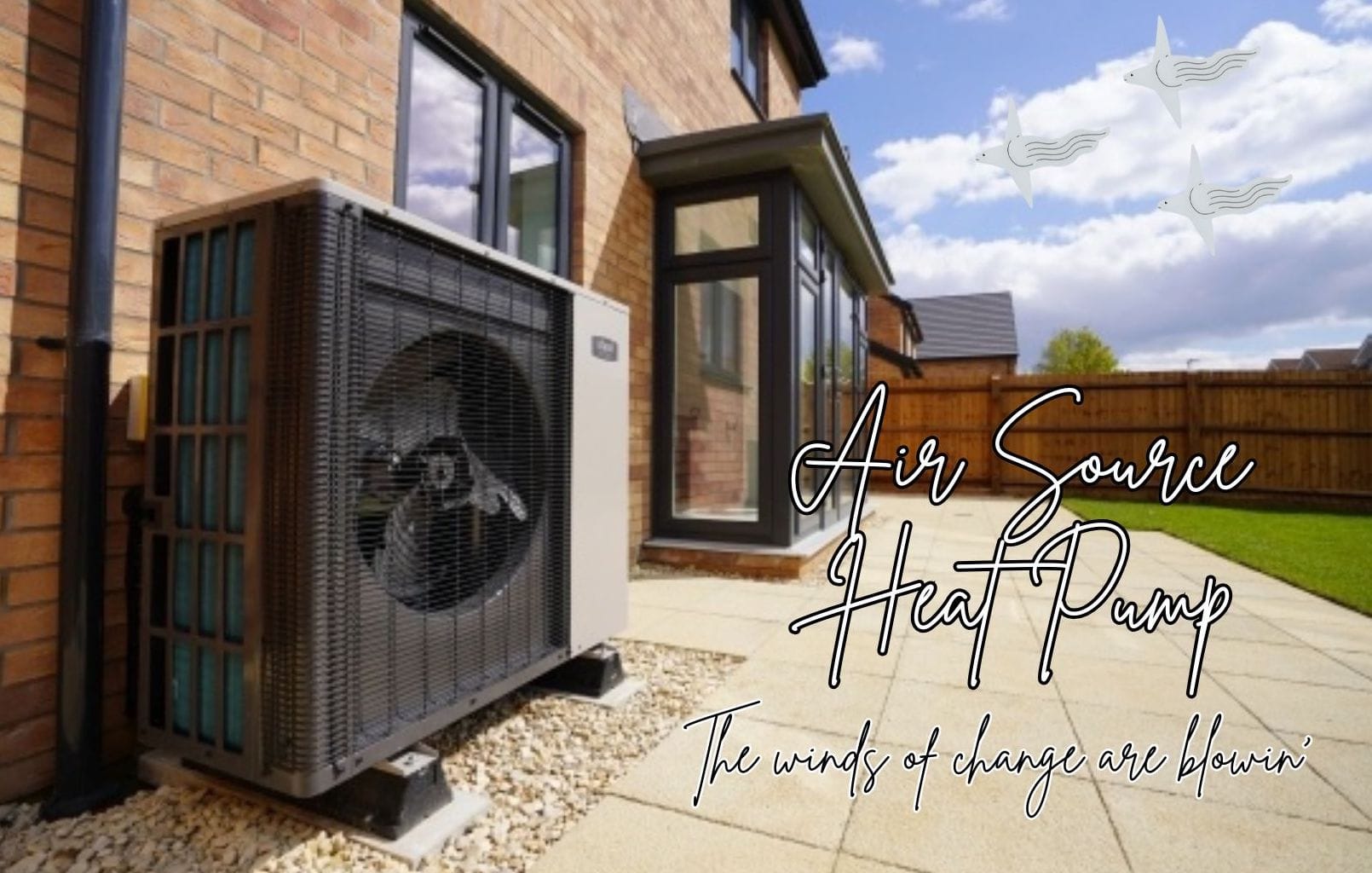
Air Source Heat Pumps (ASHPs)
We covered how these magical machines move heat around in last week's post, so I'll spare you the recap. Instead, we'll answer some of the tough questions we didn't get to last time.
How much will you save?
Switching from a gas boiler or furnace to an ASHP will cut the typical American home's annual carbon emissions by an average of 2.8 tons!
Oh, you meant money?
Well...
Not so long ago, I'd have felt way more confident saying you can expect to save hundreds of dollars a year by kicking your gas boiler to the curb.
Today, I'm not so sure. That's because electricity prices are rising all over the country, and they're rising fast. By some estimates, electricity prices are rising twice as fast as inflation. Not great!
On the other hand, natural gas prices are expected to rise, too, as the U.S. tries in vain to force Liquid Natural Gas (LNG) onto the rest of the world, driving up prices at home and slowing down the clean energy transition.
So basically everybody's bills are gonna go up, regardless of whether you're burning fossil fuels or not. How much and how soon is still unknown.
The perfect candidate for heat pumps
There's one surefire way to pump up the heat and keep your energy bills in check. You guessed it: solar panels + a home battery.
If you're in the enviable position of owning a home with rooftop solar and a home battery or EV, a heat pump is a no-brainer. Your solar+battery combo should offset the bulk of the load, providing you with effectively free heating and cooling powered by clean, green, solar energy. You're livin' in the future!
If you answered mostly C...
That's hot! You're an Absorption Heat Pump.
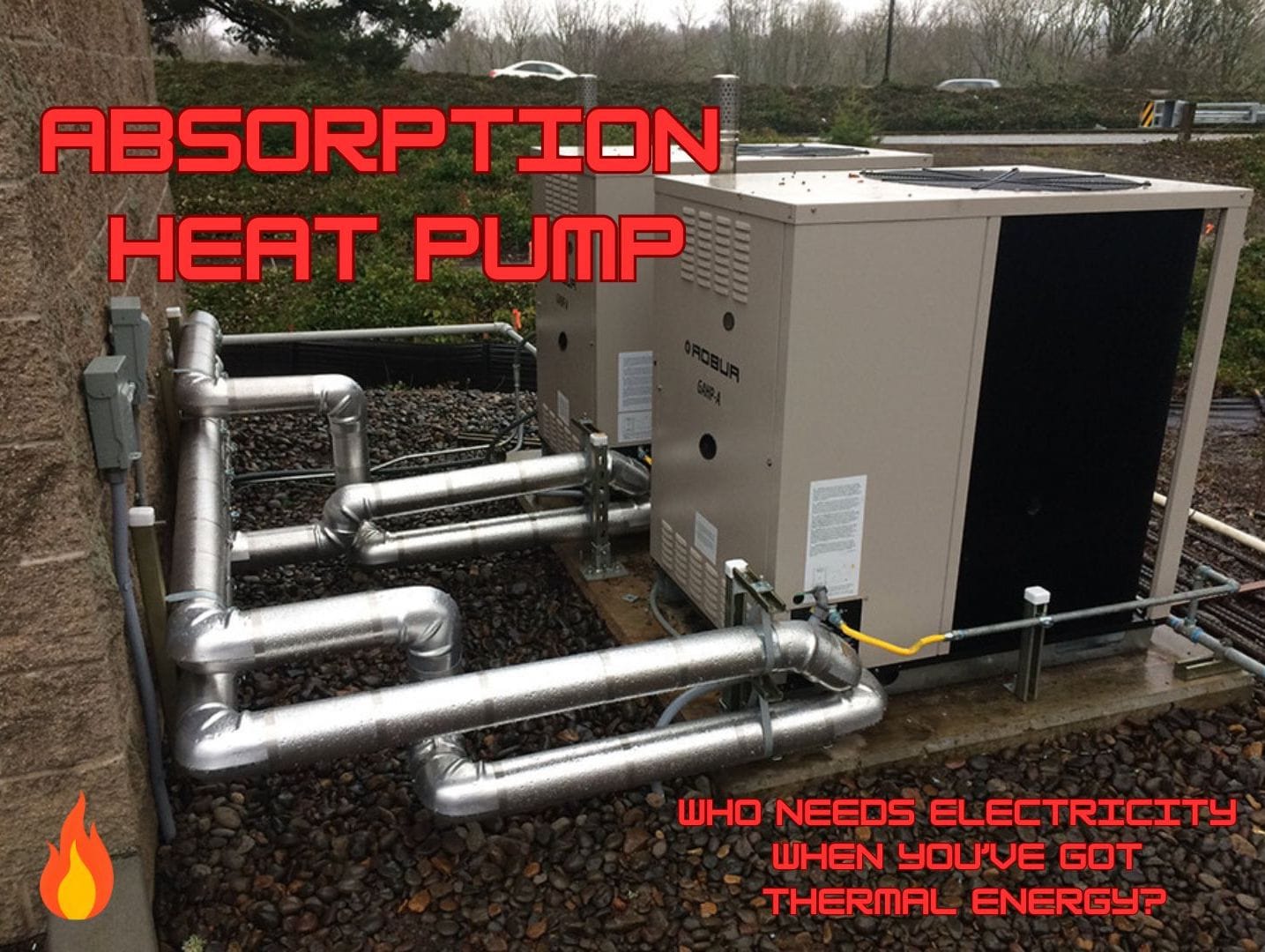
Absorption Heat Pumps (AHPs)
Absorption Heat Pumps are a rare species of heat pump driven by thermal energy, rather than electricity. Thermal energy, which just means heat energy, can take the form of solar-heated water, waste heat, or even natural gas and propane.
Wait... we're burning fossil fuels in a heat pump?!
Dude, I know! That's one reason these things are uncommon: they really only make sense in situations where electricity is ridiculously expensive, or there's lots of underutilized heat available for some reason, or you're trying to heat and cool a massive space.
Like, for example, an industrial warehouse in which heat is produced as a byproduct of whatever else they're doin' in there. Or maybe a big old mansion with a million rooms where a traditional heat pump would thoroughly gouge your utility bill.
How it works
AHPs are still heat pumps. They've got a condenser, an evaporator, and heat exchangers.
What's missing from that list? The refrigerant and the compressor.
Instead, AHPs use a fluid that acts kind of like a refrigerant (often ammonia and water or water and lithium bromide). This fluid absorbs ambient heat, evaporates and releases that heat, and then gets heated up again (in lieu of getting pressurized) by the thermal heat source.
Make sense? Kinda?
If you answered mostly D...
This quiz went swimmingly! You're a Water Source Heat Pump.
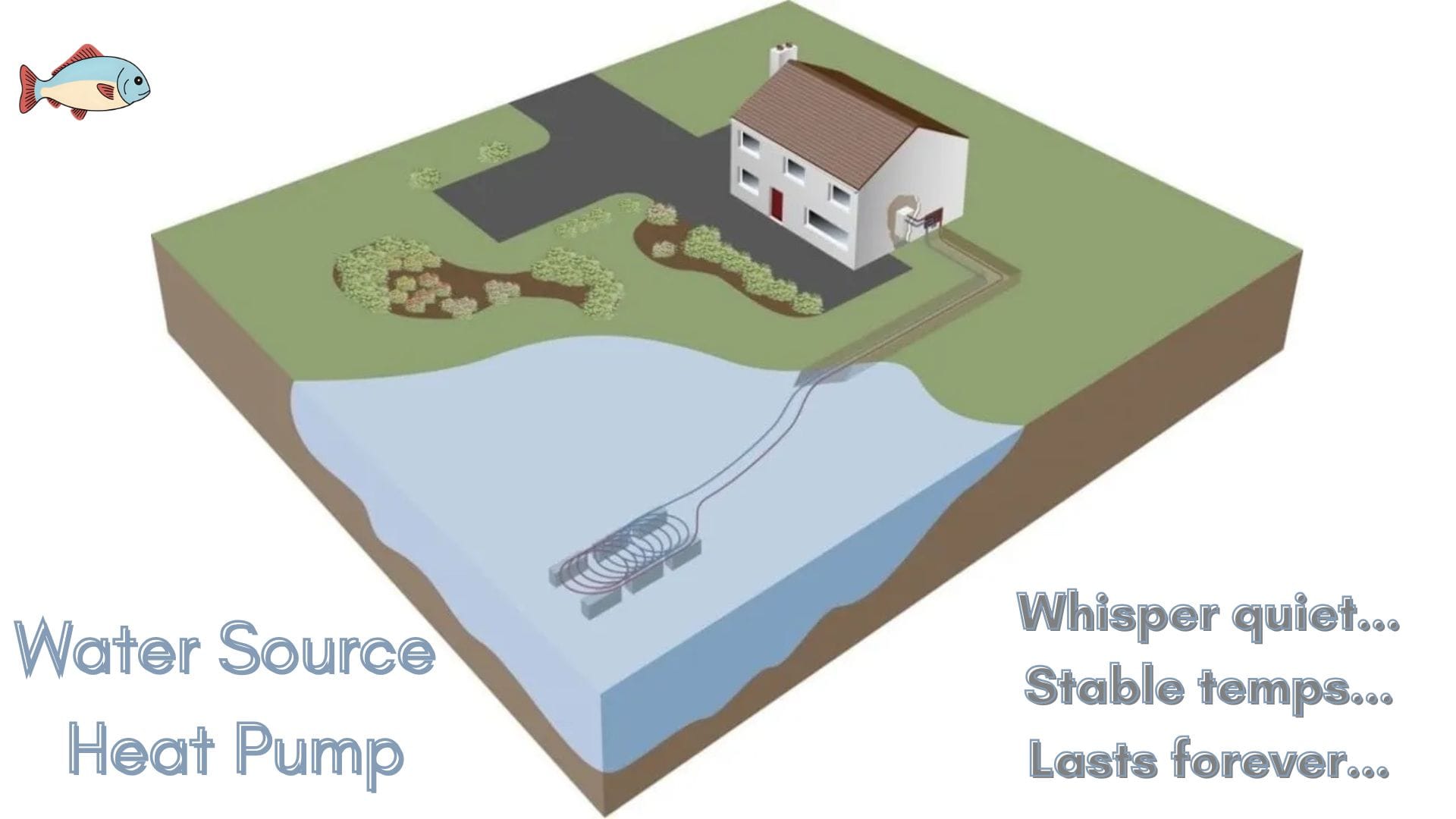
Water Source Heat Pumps (WSHPs)
Water Source Pokémon,
...I mean, Water Source Heat Pumps are similar to Ground Source Heat Pumps. They both use looping pipe systems. They both take advantage of a consistent, naturally occurring heat source. Like dirt, water will almost always be cooler than the air in summer and warmer than the air in winter, so WSHPs can efficiently heat and cool year-round.
But there are a couple key distinctions (besides the obvious one).
Closed- or open-loop systems
Unlike ground source heat pumps, which require a closed-loop pipe system, WSHPs can use either a closed- or open-loop system.
WSHP closed-loop systems are fully submerged, oftentimes in a lake. A refrigerant runs through the pipes, absorbing heat energy from the water and bringing it up to the heat pump to begin the usual cycle. You know the drill!
You'll also need to circulate a treated antifreeze solution in your pipes to prevent contamination and corrosion.
In an open-loop system, you're pumping actual water from a river, well, or aquifer through heat exchangers, then discharge the heated or cooled water into a separate source like a pond or another well.
There are pros and cons to each. I won't get too into it here, but just to name a few...
Open-loop:
- Very high Coefficient of Performance (COP)
- Cheaper to install
- Potential permitting hurdles and environmental risk
- May require more maintenance
- Requires a clean and reliable water source
Closed-loop:
- Install almost anywhere
- Longer lifespan / less maintenance
- Fewer permitting hurdles
- Higher upfront costs
- Requires regular water chemistry monitoring
Well, that was fun... and informative!




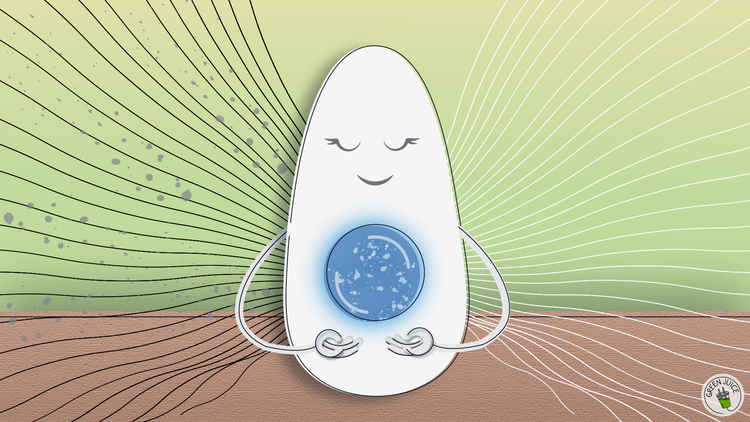
Member discussion